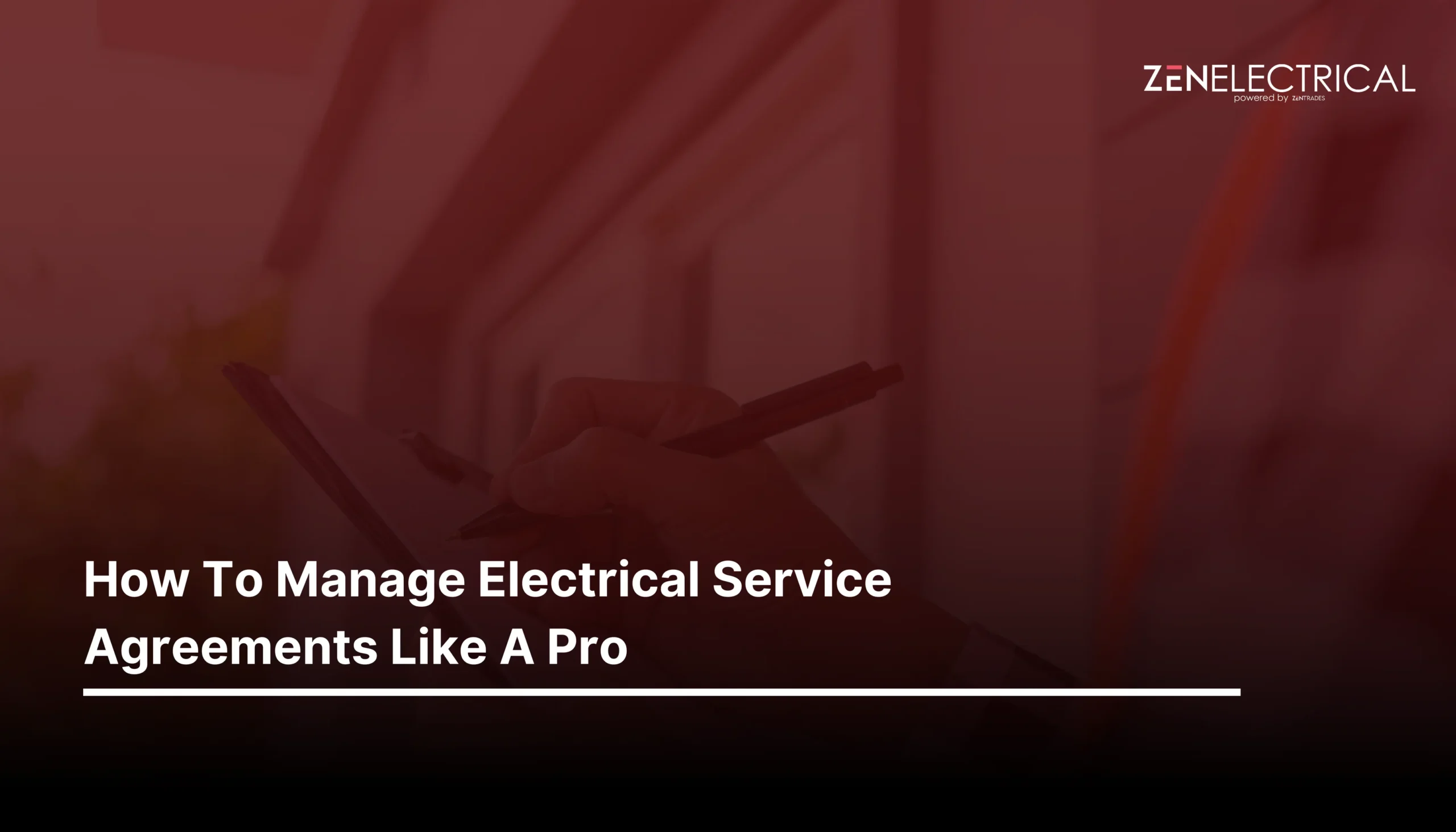Electrician Financing To Grow Your Electrical Business
- Field Service Management
- 9 Min Read
Independent electricians are critical in supplying electricity, light, and cutting-edge communication technology to buildings and communities across the United States in the fast-paced world of electrical contracting, where the sector is valued at an astounding $160 billion.
Service businesses that use electrician business loans to obtain the required financing for their operations are fueling this sector further.
Electricians have a wealth of options to grow and sustain their businesses thanks to the certainty that there is a year-round need for their services and the growing urbanization trend luring more people into cities.
However, due to their rapid expansion, small businesses must also modernize their operations and strengthen their competitiveness.
One of the modernizations is ZenElectrical’s field service management software. Streamline and optimize your workflow to generate growth and more revenue for your business!
Book a FREE demo today to start enhancing your business!
Business loans for electricians become essential resources to aid in these endeavors in this environment.
Many electrical contractors need help to raise the money required to keep up with new projects, making it difficult to meet client requests and maintain a steady pipeline of jobs. Small businesses may experience cash flow problems without access to electrician business loans.
Fortunately, new lending models have enabled electrical contractors to get small business loans quickly, allowing them to seize chances and advance their businesses.
Here What We Cover
Requirements for Loan Application
Gaining clarity on the responses to these questions before you borrow can ensure a favorable influence on your organization’s cash flows and future.
How old is your Electrical business?
If existing business owners can demonstrate to lenders their past performance, funding will be easier to come by.
Lenders will consider the income and expenses from the previous year to forecast future sales and your capacity to repay a loan.
Your financial history and any possible collateral—such as parts, vehicles, or a physical store—that you might offer as security for the loan will play a significant role in the decision-making process.
Even unprofitable enterprises can borrow, but it’s easier if you’re already running a successful business. Alternative lenders will cooperate with you if you have sufficient cash and a business plan demonstrating your company’s path to profitability.
Different finance requirements apply to small business entrepreneurs establishing new ventures. Finding a building, getting the required licenses, and investing in inventory or buying a truck and tools are all things you would need to do. Newer business owners can be directed to pledge personal assets, including investment or retirement accounts, to secure the loan.
You will know which lenders to approach based on what stage of the business cycle you are in.
Reason for needing Electrical Financing
You will already possess your licenses and certifications if employed as an electrician. You’ll need a small loan to buy essential tools and equip a vehicle. If you’re starting, you can purchase the items you need as you go and bill the client in advance.
But as you develop, buying a fully equipped van might help you save time. Making fewer trips to the hardware shop will also boost your profit margins. If you don’t waste time traveling between job sites and being a wholesaler of electrical supplies, you can accept more clients.
You’ll also need state and municipality licenses to launch a new firm. State-specific criteria apply to your business if you still need to be licensed, and you’ll also need to pay a lawyer to set up your legal business. You might pay these costs out of your funds or consider getting a personal loan.
Your company may require access to funds to meet working capital requirements, such as paying rent or payroll during a lean time. Loans for working capital assist established business owners in covering their ongoing operating costs.
Lenders provide several loan products since there are numerous reasons to borrow money. Each loan option has rates, conditions, and terms tailored to your borrowing needs.
Profit margin expected from the business/project
Your profit margin is the sum of the costs of finishing a job and the price you charge the client. Every business owner should know their profit margins, set goals and minimums, and refuse work that does not fulfill those requirements.
Any significant undertaking or capital expenditure, like starting an electricity supply business or getting a truck, should also be profitable. Remember to factor in some of your fixed costs when determining your profit margins on a job.
Assign expenses like rent, electricity, and staff salaries to each assignment one of your electricians accepts. This will enable you to determine its profitability more precisely.
Take a close look at their financials if you’re contemplating a potential acquisition, such as a local electrician who wants to retire and has given you a chance to buy their company. When compared to the cost of the loan to buy them out, would the improved sales and profits be higher?
Any endeavor or purchase should be profitable; otherwise, borrowing is not a good idea.
Timeframe of utilizing loan funds
Use the matching principle when making significant financial investments. The loan should be repaid in close proximity to the project’s completion. Before requesting a loan, it’s critical to establish an estimated completion date for your project.
Each loan package chosen by the lenders has a standard loan repayment period. This may take a few months if using alternative lenders who provide working capital loans. Expect to repay a sizable company loan over several years.
You will have a more significant loan payment if your payback period is shorter, and vice versa. When you’re no longer benefiting from the project supported by a loan, it’s not a good idea to continue making payments on that debt.
Types of Electrician Financing
Working capital loans
The cash on hand to cover regular costs like rent or salaries is known as working capital. These resources maintain the doors and lighting.
Take your balance sheet’s current assets, then remove current liabilities to get the amount of working capital that is accessible. Any penalties projected to become due in the next 90 days can be paid in full if you have a positive balance. Most financial consultants suggest that your company should always have two times as much cash on hand as current liabilities.
Maintaining this much cash on hand for many small firms, especially in the initial year of operation, can be challenging.
You may not have enough cash to pay your subcontractors if you are waiting for payment on a work.
When you’re waiting on receipts but still have expenses to pay, working capital loans assist you in managing your cash flow.
Working capital loans sometimes have periods between 12 and 26 months, which could be used to cover some of your first year’s expenses.
Short term loans
A short-term loan can be ideal for you if you need to finance a sudden project or have a sizable unforeseen bill. There can be a steep learning curve when learning how to estimate job costs, and the deposit you received could not cover up-front charges.
You can finish the job and get paid in full by taking out a short-term loan to fill in any gaps. Banks incur the same expenses for both short- and long-term loans. Banks hesitate to provide short-term loans because they can earn more money from long-term loans.
Alternative lenders provide short-term business loans with shorter durations (six to twenty-four months) and higher interest rates (9% to 45%) than banks. Those with good credit may be able to pay less than they would on a business credit card.
Poor Credit Business Loans
Negative credit business loans can help you get money, whether you have an adverse credit past or your new company needs a solid credit foundation. When a business owner’s a low FICO score, this loan form is helpful.

Use our free estimate template now
Make winning quotes in minutes—for any industry and any job.
Equipment Financing for Electricians
Having the appropriate tools for the job can make or ruin your company. You occasionally do not have money when you need to upgrade necessary equipment.
That’s where equipment financing for electricians comes in.
Loans for equipment financing assist companies in acquiring the equipment required to maintain their operations.
For equipment essential to running your business, you can receive up to $150,000 and lease brand-new or used machinery.
This can help improve operations using modern machinery. Allowing you to keep your working cash in reserve to finance other crucial areas of your company.
Equipment financing also lets you lease almost any kind of brand-new or used equipment and you can determine the equipment that your company requires. So that you can make urgent purchases and rapidly obtain funding.
Get posts like this in your inbox.
Keep learning how to run a 5-star business with our bi-weekly newsletter.

Explore a better way to grow your business. Book a free demo now!
Get organized, win jobs, and wow customers.
Book A Free Demo with ZenTrades Today!
Related Reading
Why Your Field Software Management Software Needs QuickBooks Integration
ZenTrades Why Your Field Service Management Software Needs QuickBooks Integration Read More Request Demo...
Read MoreZenTrades How To Manage Electrical Service Agreements Like...
Read MoreZenTrades The Best 5 Jobber Alternatives In 2023...
Read More


